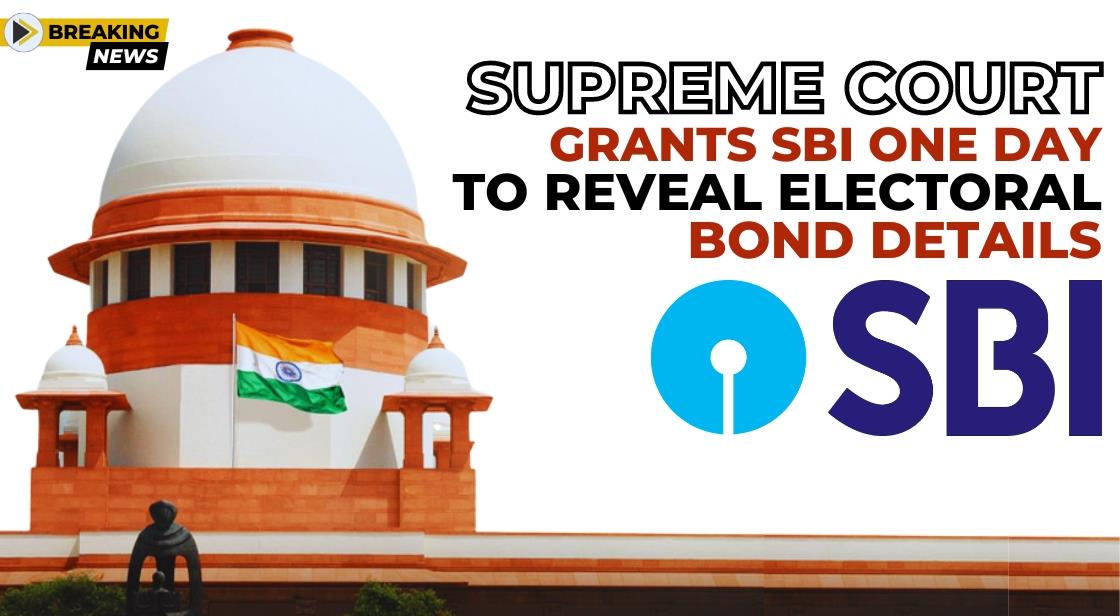Supreme Court Grants SBI One Day to Reveal Electoral Bond Details

News Synopsis
On Monday, the Supreme Court denied the State Bank of India's request for a postponement and ordered the bank to provide the Election Commission (EC) with the electoral bond information by tomorrow at the latest.
Chief Justice D Y Chandrachud led a five-judge Constitution bench that further ordered the EC to post the information the bank submitted on its official website by March 15 at 5 p.m.
The SBI Chairman and Managing Director were instructed to file an affidavit following compliance with the bench's directions during the hearing, which was also attended by Justices Sanjiv Khanna, B R Gavai, J B Pardiwala, and Manoj Misra.
Supreme Court Heard
Rejecting the SBI's argument, the Bench stated, as reported by the Bar and Bench, "We place SBI on notice that this court will proceed against it for WILFUL DISOBEDIENCE OF COURT if it does not adhere to the directions issued by the court, even though we are not exercising the contempt jurisdiction."
The Supreme Court granted the State Bank of India one day to provide information about the people who donated Electoral Bonds and the money that was donated to political parties using these bonds.
The bank's managing director and chairman were both forewarned to adhere to the deadline or face contempt.
The SBI's senior attorney Harish Salve made arguments that the court noted, stating that more time was required for the collection and matching of the facts because the data was stored in two distinct silos inside the organization.
Salve stated that if the matching process is to be eliminated, the SBI has three weeks to finish it.
Supreme Court Orders SBI to Provide "Plain Disclosure" on Electoral Bond Data
The bench stated that it had not given the SBI instructions to cross-reference donor and beneficiary data with other sources. "The SBI has to just open the sealed cover, collate the details and give the information to the Election Commission," the Supreme Court ruled.
It also inquired about the actions taken by the bank to adhere to the guidelines provided by the Supreme Court in its ruling on February 15.
"Over the previous 26 days, what actions have you taken? Regarding it, your application is mute," the bench stated.
It requested that the SBI provide a "plain disclosure" under the court's ruling.
Additionally, the court ordered the electoral commission to post the Electoral Bond data on its website by March 15 at 5 p.m.
The Election Bond Case and SBI's Request
The Center's electoral bonds program, which permitted anonymous political funding, was struck down by a five-judge Constitution bench on February 15.
The court declared the program "unconstitutional" and ordered the Election Commission to disclose the names, amounts, and recipients of all donors by March 13.
To provide information about each electoral bond that political parties redeemed before the program was abandoned,
the SBI had requested an extension until June 30. The judge also heard an additional plea asking for the SBI to be held in contempt.
Key Information From the Order on February 13
In an order dated February 13, the Supreme Court stated that political parties are important electoral entities and that voting decisions depend on knowledge of their financial support.
The court noted that there are other options for reducing black money in addition to the electoral bonds system.
Reducing black money is not a justification for violating someone's right to knowledge.According to the Indian Constitution's Article 19(1)(a), it is unlawful to withhold voluntary political donations.
The court stated that having access to information about the source of political money is a basic right in a democracy, and that companies' unrestricted support of politics violates this right.
You May Like









